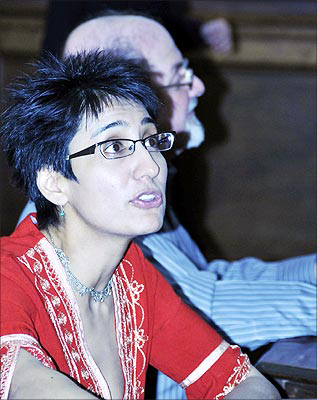 Irshad Manji and Salman Rushdie may not be able to agree on whether there is a god. But they were in agreement about the stifling effect extremism has had on every faith system, including Soviet-style socialism, although they focused primarily on the faith they were born into -- Islam.
Irshad Manji and Salman Rushdie may not be able to agree on whether there is a god. But they were in agreement about the stifling effect extremism has had on every faith system, including Soviet-style socialism, although they focused primarily on the faith they were born into -- Islam.
"People (now) are much more afraid," Rushdie said, speaking of the years following the fatwa Iranian clerics had declared against him. "There has been a chilling effect. Now people think twice before they make... almost any remark about Islam. They think twice in case somebody decides to be offended."
"It seems an important aspect of identity is being offended," he added.
The conversation was the first of a series of public conversations Manji was holding at the 92nd Street Y in New York City on Sunday to address the issue of moral courage in journalism, politics, religion and beyond, speaking to intellectuals and journalists about the future of free expression. It fell on the eve of Dr Martin Luther King's birth anniversary and on the 20th anniversary of Iran's fatwa against Rushdie.
Manji, born of Egyptian and Indian parents in Uganda and finally moved to Canada, seeks reform in Islam through itjihad, a form of Islam that allows for novel interpretations of religious texts. She has written one book, The Trouble with Islam Today, and produced one documentary, Faith Without Fear.
Despite her conflicts with the more conservative section of Islam, which pillories her for her views and her gay status, she remains a Muslim. Rushdie, on the other hand, is an atheist, who says he has been disappointed with the level of debate seen now.
Rushdie told the audience that multiculturalism had given way to an effete cultural relativism. He said that in his parents' generation, dialogue was completely open, and Beirut and Cairo were considered intellectual centres. His own father was well-versed in the Koran.
Now, there was a weakening of values, and a constant appeasement of people who say these values upset them, he said, describing the resulting thin-skinned reaction as a "culture of offence."
"The loss of intellectual freedom in the Muslim world is largely a self-inflicted wound," he said.
He cited the example of how, in the past, the dissident voices of the erstwhile Soviet Union -- including pacifist scientist Andrei Sakharov, and author Alexander Solzhenitsyn -- were prized above the party apparatchiks the Communist government trotted out.
"We are doing the opposite. That's our intellectual failure," he said, arguing that reactionary forces outside Islam also drove the debate away from a culture that allowed for debate.
Rushdie said the police had taken no action when some Sikhs protested a play by another Sikh that was a fictionalised account of abuse and murder in a gurdwara. He also spoke of how painter M F Husain had to leave India because some Hindus objected to his paintings of Indian goddesses.
Manji cited the case of strong laws being implemented in Australia to stop protests against the Catholic church. She argued that even "liberals did not appreciate that just because human beings are equal, it does not mean cultures are, too."
"Cultures are not born, cultures are constructed... There's nothing sacred about culture, which means there's nothing blasphemous, sacrilegious, or inconceivable about reforming... aspects of it," she said.
Speaking of the difference between Islamic and Judeo-Christian culture, Rushdie said the latter had "at its opposite poles sin and redemption. There's no original sin in Islam. What exists instead at the opposite poles are honour and shame." He said the accepted interpretation of the Koran has been used to oppress women. Honour is believed to reside in the male; shame is brought about by the behaviour of the female, he said. And that was what resulted in honour killings and cliterectomies of women, he added.
But Rushdie argued that bigotry also was a reality, and pointed out to the demonisation of all Muslims in the US after 9/11.
Still, when Manji said she was looking forward to the return of a more moderate Islam, Rushdie seemed sceptical citing the doubtful case of how non-Soviet socialists in the erstwhile Soviet Union believed that if only the Soviets, who were bad, were gone, could a more benign form of socialism, the real kind, take root.
A similar view existed about Islam -- that while it was brutal and violent, he said, adding that the view was that "if we could just get rid of this brutal mistake, the true faith would emerge..." Rushdie said that he was sorry but he did not believe in that.
Image: Irshad Manji with Salman Rushdie at a book-signing session in New York. Photograph: P Rajendran






 © 2025
© 2025